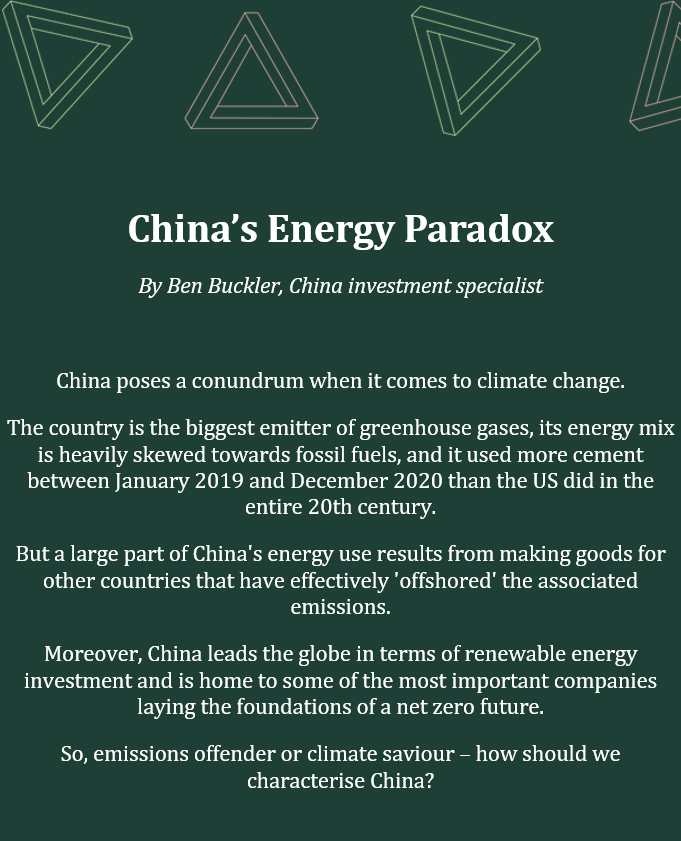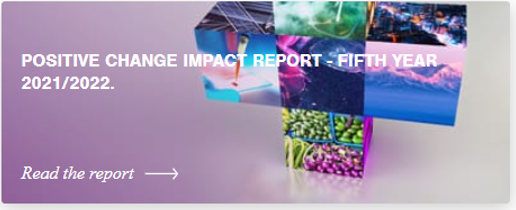ESG: investing in sustainability, not mindless scores

Tom Walsh, Investment Manager
Key Points
- The investment world is paying greater attention to environmental, social and governance factors
- But in many cases the focus is on backwards-looking ESG metrics
- We think investors should concentrate on opportunities for positive change and growth, and on supporting companies to achieve this
If it moves, measure it. The recent rise in environmental, social and governance (ESG) metrics is no exception to this mantra. So let me start by testing your knowledge.

Actual ESG
Partner Stuart Dunbar visits a vertical farm to explore how our thinking about environmental, social and governance factors helps us back great growth companies to tackle big problems.
Watch the film – Actual ESG: growth investing in change | Baillie Gifford
Read the article – Actual ESG: Let’s talk about Actual investing part 2

Climate solutions: working back from 2050’s low-carbon economy
Helen Xiong, Investment Manager Caroline Cook, Head of Climate Change
Key points
- It’s useful to imagine a net zero world and ask what made it possible
- This technique can help investors identify long-term opportunities
- We need companies to create game-changing solutions to global warming, and risk-based metrics can be a distraction

Edinburgh’s Newhaven district is a fitting place to discuss climate change. Historically it was famous as a landing point for oysters, which grew in abundance in the Firth of Forth.
Their shells absorbed and permanently locked away carbon from the water and atmosphere before industrial developments and overfishing wiped them out.
These days the harbour is home to only a few dozen fishing boats moored close to an upmarket restaurant. But the estuary may deliver another blow to the area.
Two members of a US think tank recently published a study in Nature predicting that rising sea levels caused by global warming could threaten 150 million people’s homes globally by 2050. They accompanied it with an interactive map that forecasts Newhaven’s shoreline will be among locations below annual flood levels by that date.

ESG engagement and analysis: supporting Reliance’s vision and ambition
Abhishek Parajuli, Investment Analyst
Key Points
- Risk-focused rating agencies give Reliance Industries relatively low ESG scores
- But the Indian firm’s offer of cheap data via its Jio division and investment in green energy have long-term benefits for the environment and society
- So our engagements focus on enabling Reliance to meet its promise without shying away from governance concerns

All investment strategies have the potential for profit and loss, your or your clients’ capital may be at risk.
Reliance Industries is among the world’s most transformative businesses.
The conglomerate’s status as one of India’s biggest fossil fuel producers still drives much of its earnings, but increasingly its focus is on eco-friendlier sources of energy.

ESG visualised: China’s energy paradox
This article is part of our Environmental, Social and Governance (ESG) series. See more material here


The decarbonised economy: backing climate change solution providers
Key Points
- Wind and solar energy are not only cleaner than fossil fuels but set to be less costly too
- Batteries and hydrogen will also play a role in storing and transporting renewably-generated energy
- But we also need ways to remove carbon dioxide from the atmosphere, creating opportunities for innovators such as Climeworks

Past performance is not a guide to future returns.
There’s no shortage of wind in Orkney. When you visit, you don’t just feel it whip at your skin but notice the many wind turbines spinning across the islands.
They aren’t limited to the large-scale wind farms you might be familiar with. Orcadians have installed more than 500 micro-turbines in their gardens to generate electricity for their own use and to sell to energy companies. That’s the equivalent of nearly one for every 20 of the islands’ households. And these are supplemented by about 350 solar power installations.

Positive Change impact report
